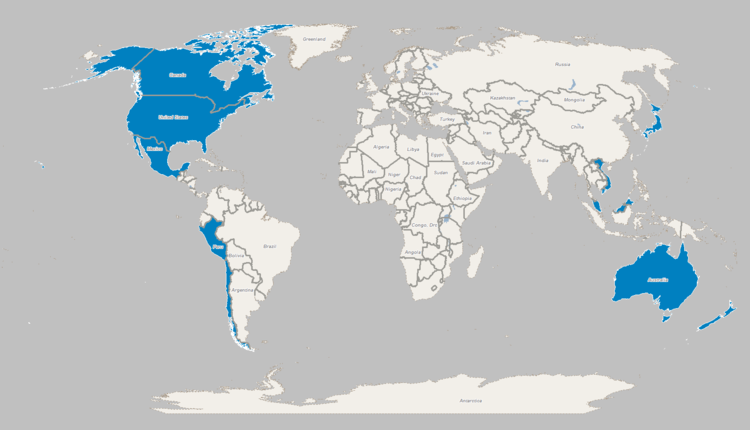Shippers, as well as the U.S. economy, prosper when exports are moving in high volume. Exports allow us to support business growth in the form of job creation and revenue. If we examine history, The Great Recession (2007-09) took a devastating blow on the gross domestic product (GDP) and import/export volumes. The housing bubble caused many banks to collapse and refuse lending. As a result, investments in manufacturing, a top trading sector, suffered dramatically. Before the crisis, the World Trade Organization (WTO) reported a 6-percent average annual growth of export and import volumes by country. Today, WTO economists predict the average growth will reach 4 percent in 2016. Although the world merchandise percentage is below the ideal average, the past few years have shown overall growth and opportunity in the Asia-Pacific. Improvements in geopolitical negotiations and the growth of e-commerce show a promising future for U.S. exports. With these changes, we are seeing parcel carriers expand their global offerings, and shippers eagerly anticipate the opportunities ahead.
On October 5, 2015, 12 nations finalized negotiations over the Trans-Pacific Partnership (TPP) Agreement. The TPP covers more than 40 percent of global GDP and will write global trade rules that ensure fair governance between nations. The TTP has received business support and is expected to promote more trade among nations.

|
Along with geopolitical progress, UPS is now expanding their global capacity. On October 19, 2015, UPS will expand its Worldwide Express service in 52 countries. This will be the largest one-time expansion in the service’s history, and 65 countries will now be eligible for midday delivery (10:30 a.m., 12:00 p.m., or 2:00 p.m.). Shippers who were previously limited to end-of-day deliveries (Worldwide Express Saver) will find this especially beneficial. Forty-one thousand new postal codes are added, and the majority of them are in the Asia-Pacific region.
FedEx, another leader in international shipping, has yet to announce an expansion of their global services. They have, however, made multiple announcements in strong support of the TPP. FedEx believes the TPP standards and procedures are ideal for streamlining trade, and will allow them to move packages more efficiently.
The Asia-Pacific is now offering more exporting opportunities than ever before. Not only will shippers take advantage of increased delivery coverage and reduced transit times, but they’ll also have the ability to ship goods without facing excessive tariffs or trade agreements. Also, with the TPP procedures that streamline processes, shippers can expect to receive quicker turnover, increased revenues, more domestic jobs, and a greater presence in the global market. Shippers will also be able to push their e-commerce efforts across an open internet that isn’t limited by trade barriers or censorship laws.
The barriers that once turned shippers away from the Asia-Pacific will soon become a thing of the past. It important for businesses to adapt and develop their models and strategies so they can succeed in export markets. Exporting across the Asia-Pacific will prove to be enticing for companies seeking global customer satisfaction and a greater presence in the global market. Ninety-five percent of the world’s potential consumers live outside the borders of the United States, and businesses that do not export will not take full advantage of their brand. With carrier accessibility, trade negotiations complete, and streamlined processes, now is a better time than ever to take advantage of exporting.
Elijah Moon is a Transportation Analyst with the Transportation Solutions Consulting Group at enVista. He has more than 3 years of experience in the parcel and freight industry. Elijah is responsible for identifying and measuring key transportation opportunities that allow clients to optimize transportation cost for domestic and international shipping. He has extensive knowledge of carrier agreements, data collection, modeling tools, and route planning that allow clients to reduce cost and maximize carrier performance. Some of the customers he has worked with include 1-800 Flowers, Tommy Bahama, Brighton Collectibles, and PetSmart.
Elijah has a bachelor’s degree in Informatics from Indiana University.















